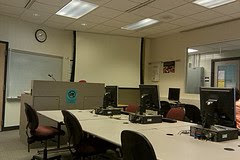The first one I will bring up is my former classroom. Here is a picture I took:
As you can see, it is a long room, with lots of space for each computer. This concept works well for student comfort. It does pose some problems for seating charts and student management. I was always conscious of student needs, and potential problems. And there was always a change to be made. The students in the back seem to get further and further away...... I liked the room, but would not design one in this layout, because it is difficult to scan the room easily.

The next pictures are of the professional development labs at the technology center. These are smaller labs, with about 17 computers per side.
Notice the room dividers - it is possible to open the room up for a larger professional development group. Both sides are identically equipped, with projectors, speaker podiums and Dell computers. I enjoy PD classes in this lab. The tech center has a few labs set up this way. You always feel within reach of the instructor, yet you have enough room to get comfortable. Management is easier, because this layout is more circular than long aisle.
I do not have pictures of my favorite lab, but if I ever get the chance to design a computer lab, I promise to model it after this one. In the 200 section of Homestead HS in Mequon there is an iMac lab that is the most manageable I have seen. The computers sit on the perimeter of the room, with an instructor desk in the middle, equipped with a projector, and desktop sound system. I say desktop sound, but it was a good one, with decent throw. There was never a problem hearing a video. I like the room for its immediate manageability. All the instructor has to do is scan the room to make sure everyone is on task. The only problem with the room is the computers are very close together.
3 rooms with the same purpose, but very different designs. Interesting......


